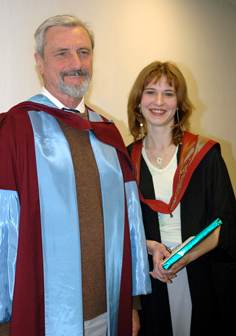Hybrid Clustering Method for Fast Content Retrieval in Multimedia Databases
 Elena Yegorova graduated from Kharkiv National University of Radio Electronics (KNURE), Ukraine and has recently passed her MPhil viva at WIT with a thesis on “Hybrid Clustering Method for Fast Content Retrieval in Multimedia Databases”. The external examiner was Dr. Paul Lewis from the University of Southampton, UK and the internal examiner was Prof Carlos Brebbia.
Elena Yegorova graduated from Kharkiv National University of Radio Electronics (KNURE), Ukraine and has recently passed her MPhil viva at WIT with a thesis on “Hybrid Clustering Method for Fast Content Retrieval in Multimedia Databases”. The external examiner was Dr. Paul Lewis from the University of Southampton, UK and the internal examiner was Prof Carlos Brebbia.
Grateful acknowledgement and appreciation is given to the Foreign Office and Commonwealth Office for supporting this program.
In this thesis a clustering method is described which, at the image retrieval stage, ensures a minimal number of comparisons of a query image and images from image database. The clustering procedure can be fulfilled in the feature or the signal space and the developed method enables the construction of image retrieval systems with minimal query time. Simulation results allowed pointwise set maps of -clustering to have their own objects. These results are not in conflict with the traditional approaches, moreover they can be effectively combined with them.
The two-level hierarchical -clustering combines the advantages of existing groups forming approaches and methods for partitioning sets, which provides a dramatic increase in the productivity of the decision making systems. Actually the larger number of objects there are in a database, the more significant the results, using the proposed methods. Experimental research of -clustering was carried out on different feature families including average value of brightness, average quadratic deviation, energy of distribution; entropy distribution; asymmetry parameter, degree of excess, entropy distribution, contrast, inverse differentiation moment; shape characteristics, functional invariants to one-parametric transformations, moment invariants, and the identification of images using a Euclidean similarity group.
The proposed method ensures a minimal number of matches at the CBIR stage for arbitrary images collection in feature or signal space. Moreover this method guarantees the best result in a worst-case scenario. The further development of the suggested methods may be to explore hierarchical clustering which would allow to carry out more exact partitions minimizing number of matches.
As a result of the presentation and defense of the thesis both examiners recommended to award Elena Yegorova the degree of Master of Philosophy.


 Wessex Institute
Wessex Institute